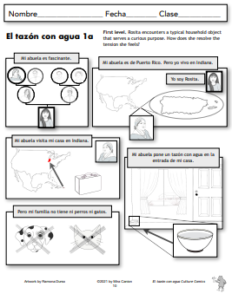Culture Comic – El tazón con agua

Want an alternative to Day of the Dead/ Día de Muertos?
Culture Comics can help your students dig deeply into culture.
- 3 levels of an authentic story
- 7 total versions with full comics, partial comics, and limited visuals to shrink the visual support as you read.
- 48 pages
- Matching, sequencing, advanced cultural questions, comprehension questions in Spanish and English, written prompts, word clouds. Running retell activity.
Available here: Culture Comics – El tazón con agua

Can you have a cultural practice without believing in it?
As Spanish teachers, we often highlight the Day of the Dead (El Día de Muertos) celebration in our classes. We tend to compare this celebration exclusively to Halloween that originated as a Celtic Samhain tradition. Do we believe in Samhain traditions by celebrating Halloween? Or is Halloween more about the costumes and the candy? Do we have cultural practices that are no longer tied to the original belief or reason for the practice?
There are many ways our beliefs materialize in our daily habits, not just during larger celebrations. Those beliefs and cultural traditions could easily be compared to perspectives from other cultures. Or they could be compared with differing perspectives from within our own local communities.
How are our ideas and perspectives different? What is common to all of them?
For example, Christianity is grounded in a belief of the afterlife. How do those views overlap with the beliefs surrounding the Day of the Dead? Does everyone have a belief about spirits, those unseen beings who have no physical bodies?
At what point do we take the traditions that have been passed down to us and make them our own beliefs? Our grandparents often pass down their beliefs to us. A great example comes from the most widely-read Spanish language author, Isabel Allende. She centered her first book on her grandmother’s practices around spirits. Her grandmother conducted séances, that is, attempts to communicate with the dead, subsequently landing the family into conflict with the local Catholic Church in Chile. The title itself of Allende’s book, La casa de los espíritus, focuses the reader on the belief that spirits reside inside our houses. Does Allende practice her grandmother’s traditions? They certainly do enrich her writing.
What if you could easily introduce students to hidden cultural perspectives?

In the first story of our new Culture Comics series, El tazón con agua, 6-year-old Rosita receives a visit from her Puerto Rican grandmother. Rosita notices a common household object. Turns out it is anything but common. What could it be? What is the cultural perspective behind this practice?

With nearly 50 pages of visually-supported texts and activities, El tazón con agua Culture Comics can enrich your classroom as a mini-unit. There are three levels of texts to use with first-semester Spanish 1 through AP.
Culture Comics have simple storylines that narrate daily life. They offer intriguing topics that students can compare and contrast with their own cultural practices.
Features:
- Comprehensible cultural input
- Authentic, first-person experience
- Intriguing, accessible story for Spanish 1 students
- 7 versions of the story
- Scaffolded visual support
- Science, family traditions, and beliefs
- Grandparents’ perspectives
- Present and past tenses
- Professional graphic artist
- Printer-friendly layout
- Printable pages for students
- Multi-level resource
- Lesson plans
- Immediate differentiation
- Student response sheets
Activities:
- Brand-new activity: Running Retell
- Create your own comics
- Deleted Scenes
- Cultural Comparisons
- Cultural Products
- Basic and Advanced level text-based questions
- Extended reflection questions
- Quiz, Quiz, Trade
- Sequencing
- Matching
Other related products:
Tumba: A popular Día de los Muertos novel
Want to explore a boy’s similar experiences with his grandma in a CI reader?
Alex is becoming skittish as the Day of the Dead celebration approaches in the CI novel, Tumba. He should be excited, but his grandma’s creepy conversations with returning spirits is nerve-racking. Some say she is a witch, and Alex is beginning to believe it. However, the discovery of grandpa’s sketchbook could change his mind.

Tumba is an easy Spanish reader, containing just 170 new vocabulary words and many English-Spanish cognates. An extensive, accompanying teacher’s manual for Tumba is available at MiraCanion.com.
Need a whole class package with audio tracks and the teacher’s manual?
Happy reading!